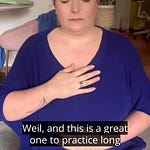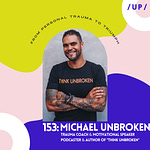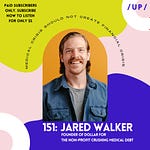Kelsey Darragh is a writer, comedienne, and former Buzzfeed producer. She currently hosts the podcast Confidently Insecure, and is a regular on Dating: No Filter, where she boldly shares some of her best and worst dating escapades (season 3 premieres Feb 4th on E!). You may also remember her from a series she did with former guest Lara Parker – Can We Cure – which took them both to a laser clinic in Florida to explore chronic pain management therapies. Kelsey may be funny as hell, but she also lives with one of the most painful chronic pain conditions we know: trigeminal neuralgia (as well as anesthesia dolorosa, a co-morbid condition that causes her to have constant facial pain). An outspoken LGBTQ+ and mental health advocate, she’s also been very open about her struggles with anxiety, and has partnered with organizations like NAMI to raise awareness. In this episode, we get down and dirty on ableism, life with chronic pain and anxiety, gaslighting in the medical industry, and how we need to actively seek to change our perspectives in order to better understand the world around us. Ladies and germs…meet Kelsey.
Tune in as Kelsey shares…
- that she developed trigeminal neuralgia (TN) after two botched jaw surgeries
- that her surgeon gaslit her from the get-go after her surgeries, telling her it was all in her head and part of the healing process that she should be in such pain
- that her surgeon has avoided her since, and she is now seeking legal action against him
- that she started making content about her chronic pain in 2016 in response to her own frustration
- the difference between a statute of limitation and a statute of repose in medical malpractice lawsuits
- her mission: to turn her pain into purpose
- that most people with TN don’t get the chance to move forward with litigation – which is part of the reason she’s pressing on
- that her TN pain comes in flares, and she was last admitted to the ER in 2017
- how anesthesia dolorosa presents: her main source of daily chronic pain, it is confined to the bottom half of her face and constantly creates burning, stinging, and fire-like sensations
- that she’s had an anxiety disorder since she was young
- the mental health aspect of living with chronic illness – and how important it is to take care of one’s mental health, especially as a Spoonie
- that she also developed agoraphobia in response to her chronic pain – because of the unpredictability of her TN flares
- that she told herself she wouldn’t let her chronic pain stop her from living – she actively seeks to leave her comfort zone now
- that she doesn’t take for granted that she presents as able-bodied, and doesn’t appear outwardly to be disabled
- the concept of “bravery” for Spoonies, and what it really means
- how gaslighting can look so different in the medical industry between white women and women of color
- the challenge of being an advocate when you struggle to take care of yourself, as well
- that she has exit plans for every situation in order to curb the anxiety she has in relation to her chronic pain
- how she communicates with her pain: she invites it along with her in order to control her feelings about it, making the choice to keep living despite it
- that she endorses the use of medical marijuana before pharmaceuticals for pain management – but that she can only tolerate CBD, and not THC
- that she uses pharmaceuticals, acupuncture, and various other modalities regularly to treat her pain (in addition to CBD)
- that she’s started taking better care of her whole body with exercise, going sober, fostering animals, prioritizing high-quality rest, and being intentional with her energies – doing the work
- that she recognizes her privilege in access to treatments, lifestyle modifications, and medicine
- that laser ultimately didn’t work to treat her TN – but some forms of TN can still be treated with it (and Kelsey recommends TN patients look into it)
- why her partner, Jared, is such a good support system
- how self-advocacy looks for Kelsey: boundaries, and a clear discussion of expectations
- that she offers fellow Spoonies permission to practice self care in whatever way they require
- the importance of checking your ego when practicing self-care, and understanding perspectives other than just your own
- examples of prejudice she’s experienced in the medical industry
- her top tips for chronic pain patients
- that part of the process of acceptance and growth she’s endured has been to mourn the person she once was and embrace her post-surgery life – which has, in many ways, empowered her














Share this post